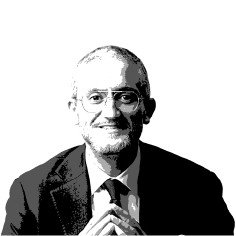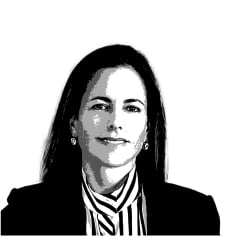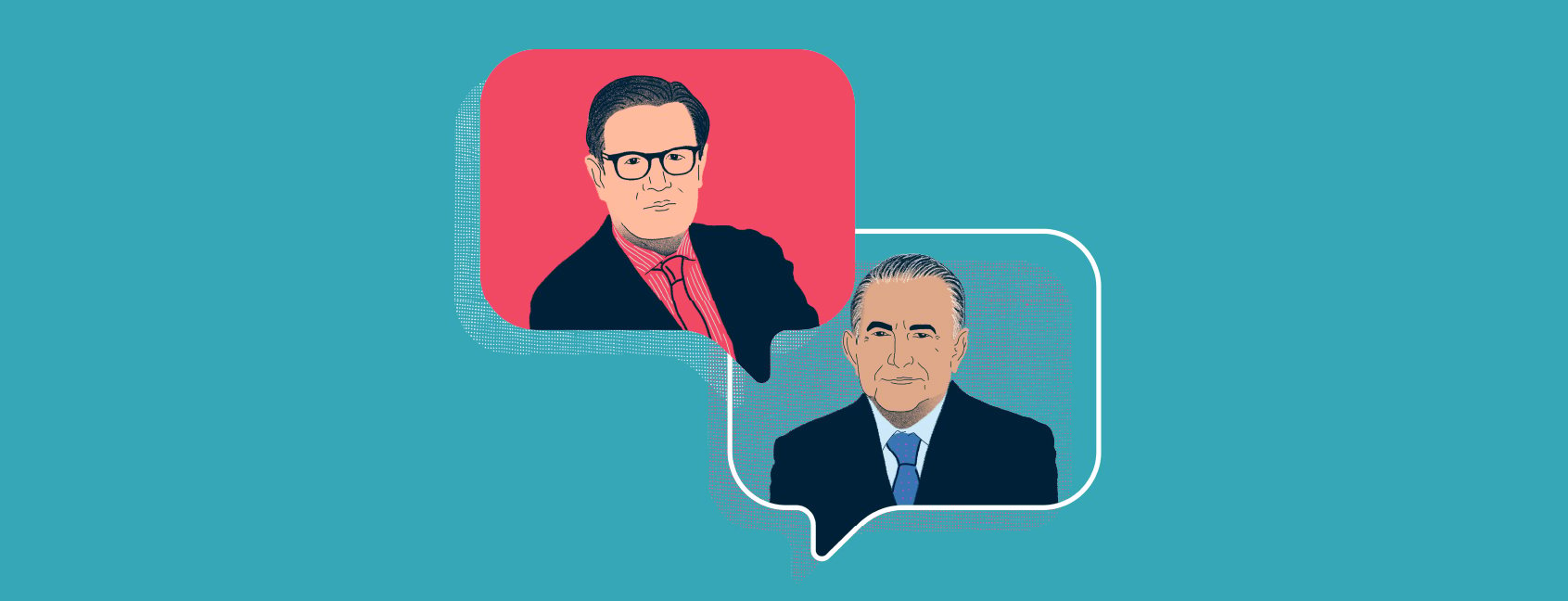-
TrendsLatin AmericaCreativePolarizationReputation
-
SectorIT and Communications
-
CountriesGlobal
Over the past fifty years, Gustavo Cisneros was among the most influential business figures in the Hispanic world and the United States. He inherited a group of businesses in Venezuela from his father, and his optimism and insatiable curiosity led him to expand across Latin America, the U.S., and much of Europe. Along the way, he faced various challenges, including political obstacles brought on by the rise of populism in his home country. Yet despite these difficulties, he achieved his goal: creating a robust company spanning various sectors—ranging from beverage bottling to television and tourism— while simultaneously making a positive impact on society through investments in sustainability, education, and the arts.
Cisneros passed away on December 29, 2023. In the years prior, he had worked closely with José Antonio Llorente, founder of LLYC, and the two had become friends. When Forbes requested Llorente to write an obituary for his friend, he delivered an emotional and memorable piece. “Gustavo was no ordinary person—far from it,” Llorente wrote. “He had a certain magic that made him compelling, persuasive, funny, a born salesman, and inspiring in whatever challenges lay ahead,” and many of these qualities could also be attributed to Llorente.
Not many people know that Llorente needed assistance to write the article because he was already seriously ill when Gustavo passed. This tribute to his friend was one of his final acts. He passed away on December 31, and that same day, Forbes published his touching piece.
In this open and moving conversation, Adriana Cisneros and Alejandro Romero reflect on the friendship of their predecessors and the lessons they learned about leadership and social impact.
Adriana Cisneros succeeded her father as CEO of Grupo Cisneros, and Alejandro Romero is now the Global CEO of LLYC. Both worked closely with their predecessors, getting to know them personally and professionally. In this heartfelt conversation, Adriana and Alejandro reflect on their friendship, the traits that made their predecessors the exceptional leaders they were, and the importance they placed on the social impact of their companies.
This issue of UNO Magazine highlights the social polarization of our times, focusing on a common trait shared by the two men: their ability to listen to diverse perspectives and their commitment to fostering connections between people and nations.
LEADING WITH CURIOSITY
Adriana: It’s incredible that these two men, at their age, decided to become best friends. It says a lot about the kind of people they were and what they had in common. They were both extremely curious, always eager to understand different viewpoints. I believe this enthusiasm fueled their friendship, which was sometimes dynamic and strategic but mostly light and fun. Their willingness to embrace new possibilities shaped their leadership. My father was all about curiosity and optimism, always wanting to stay on top of everything happening at any moment. But José Antonio was the same way. They were the youngest “old men” I have ever known.
Alejandro and I used to laugh because we were always exhausted after working with them. They were the first to arrive at meetings and the last to leave the party, constantly coming up with ten times more ideas than we did. We always joked that it was up to us to manage the flood of ideas coming from my dad and José Antonio. And that’s partly how we inherited their friendship.
Alejandro: José Antonio and Don Gustavo were modern men. Don Gustavo was always up to date on what was happening on Facebook or how X worked. On the other hand, José Antonio had developed a full-bodied digital persona. However, considering the theme of this issue, it is important to emphasize their capacity to engage with both sides of any debate, even the extremes. Don Gustavo could meet with Barack Obama and George Bush, Donald Trump and Bill Clinton, Felipe González and José María Aznar. The best way to avoid polarization is by engaging in dialogue and understanding both sides. I learned something similar from José Antonio. Few people can listen and avoid polarization; you need to bring both extremes together. Don Gustavo and José Antonio’s homes were places where both sides could coexist. Virtue lies in finding balance, and balance represents the middle ground. I’ve learned to apply that to my leadership style.
Adriana: Empathy was also crucial for my father. He could land in any country, make connections, set up businesses, and understand the market. I suppose that the ability to travel the world and feel at home anywhere was part of José Antonio’s success, too. Maybe it was a genetic trait—my grandfather could have settled for being the king of Venezuela, but he thought Venezuela was too small. That mindset became part of the company’s DNA. We’ve never felt restricted by borders.
But the issue of borders is complex. Sometimes, American partners or friends call me to ask for advice on expanding their business in Latin America. That’s a mistake. It’s like if I said I wanted to expand into Africa. Sure, you can have a global strategy, but it has to be hyperlocal at the same time—both mindsets need to go hand in hand. I think much of our international success came from understanding that.
To avoid polarization, we need the ability to bring together both extremes. Both sides were welcome in the homes of don Gustavo and José Antonio. Virtue lies in balance.
Alejandro: Don Gustavo had a way of making the world seem smaller—you could have breakfast in New York, lunch in Panama, and dinner in Buenos Aires. I remember the launch of his first book; he held two press conferences a day, each in a different country. Being a global citizen fueled his business vision. José Antonio learned this partly from Don Gustavo. He quickly realized that Latin America was the natural area of expansion for the company because they spoke Spanish there. That didn’t mean it was easy—on the contrary. However, it was the most straightforward option for a Hispanic communications company. José Antonio also had a deep commitment to Europe and championed the idea of Europe. Both men were not constrained by borders and believed that inclusion, diversity, and multiculturalism were essential for their business success.
SOCIAL COMMITMENT
Adriana: In my father’s case, their social commitment was tied to a particular idea of citizenship. It was a sophisticated concept for him, not something he did for positioning reasons. And he was lucky to have my mom, Patricia Phelps, or Patty, as his intellectual partner. His focus was always on education, but it extended to other areas too. When we enter a country to set up an operation, we have a different sense of time than many other companies. We usually stay in a country for a long time. And when that happens, when you wake up day after day, you always have the same neighbors. When you think about it that way, you’re willing to invest in your neighbors’ wellbeing and behave more responsibly.
For example, the Cisneros Foundation has been operating in the Dominican Republic for 15 years. Still, I only recently started building the Four Seasons hotel as part of Tropicalia, a real estate development in Playa Esmeralda. When we secured financing from the Inter-American Bank, not only did they give us the highest social score in the bank’s history, but they didn’t have any recommendations for improving our social investment practices, which had never happened before. All the businesses we’ve built are at least medium-term ventures, which has forced us to reconsider our role and makes a huge difference. We’re the opposite of mercenaries.
Alejandro: I’d like to highlight initiatives like your @Clase channel, the first educational television channel, or Miss Venezuela. There’s probably nothing more frivolous in today’s society than a beauty pageant, but you turned it into something aspirational. It became a platform that helped people, often from disadvantaged economic backgrounds, to become artists, presenters, or leaders in their communities. The company has always combined social impact with business.
José Antonio was also highly attuned to these same worlds, which he shared with Don Gustavo. They both wrote books, collected art, and opened their collections to the public for cultural impact. You learn a lot from that—not because they sit down to teach you, but because you see the impact of those actions.
Gustavo Cisneros’ social involvement stemmed from a particular vision of citizenship. It wasn’t something anyone told him to do for the sake of positioning.
Adriana: My father insisted that I become his successor, which I thought was a terrible idea at first. In the end, we agreed to have a structured conversation over three years so I could make the decision, and when I finally did, I had only one condition: I also had to run the Foundation. I literally told him, “Half of my heart beats for business, and the other half for social investment.” He didn’t like it because he knew the Foundation’s work was immense and complex, but he had no choice. It was one of the best conditions I’ve ever set in my life.
INNOVATION
Alejandro: Earlier, I mentioned how modern they both were. During the tribute to José Antonio, someone described him as a Renaissance man. I coupled that idea with constant innovation. I remember a time when someone in their twenties or thirties complained about the launch of a new social network, Threads, to compete with X. “Do we really need the stress of another platform?” they asked. José Antonio replied, “Give it love.” Here was a 63-year-old man, clearly not a digital native, telling a digital native to give a new platform attention in case it became more important than X in the future. He always shared the mindset of “Welcome to today’s world.” You had to try everything.
Adriana: For a longstanding company, innovation poses a complex challenge: maintaining the discipline to innovate constantly. It’s tough. People get comfortable, and leaders age. We’ve always been super innovative, except for 15 years. When Hugo Chávez won the presidency, he declared my father the number one enemy of the state. Chávez would go on his infamous broadcasts and attack us daily as a group, as a family, and him personally. My father received daily death threats
That’s when the decision was made to move the whole group to the U.S. and set up in Miami. The transition was extremely difficult. We had to build production studios in Florida to fulfill our contract with Univision. We brought along our executives, and we had to find offices, schools for their children, and so on. At this point, people started talking to me. I realized that the group had been so focused on survival that innovation had been wholly neglected. It’s very hard to try to survive and innovate at the same time. So, once we were settled in the U.S. and had managed to survive, I realized we had to start innovating again. That’s when the digital revolution came in.
What was interesting about my arrival wasn’t that I was particularly smart or innovative but that I represented a fresh perspective. I said, “All the TV channels are doing this. There are different opportunities. We need to change our mindset.” And there was openness to that. We became innovators once again.
STRATEGIC OPTIMISM
Adriana: Both José Antonio and my dad were optimistic people. The world is divided between those who are and those who aren’t. Their optimism made my dad get up every day thinking, “There’s a new person I can meet, a new angle we can take, a way to reconcile these ideas.” It was an optimism that could even be excessive at times. Some people said his optimism was contagious, but it was sometimes overwhelming for me. That’s where this unbeatable energy and desire to keep doing things came from.
Innovation is one of the most complex challenges for any long-standing company—keeping the drive to continue innovating is no easy feat.
Alejandro: Optimism also had a strategic side. From both of them, I learned that relationship management is part of business. Understanding both extremes is key to being successful. For example, Don Gustavo always made you feel like the most important guest in his house. José Antonio did something similar: if you liked a certain wine, you’d arrive at his house, and he’d have that wine there, picked just for you. It was this ability to create emotional bonds. And, of course, that had professional implications: it allowed them to push you to go the extra mile.
Adriana: You’d go the extra mile
Alejandro: Absolutely. That’s exactly how it was.
Adriana: Even if they were happy, they’d still give you the sense that you owed them just a little more. It was part of their work dynamic.
Alejandro: You could do an excellent job, and they’d still say, “It could have been better.” But it was that emotional connection that made you give more. That’s why I say their optimism and curiosity also had a strategic element. They’d make you feel like the most important person at the table, but they’d also ask for more. That was a trait both of them shared.
LEADERSHIP IN THE AGE OF POLARIZATION
Adriana: The world has always been polarized. But it’s indeed affecting our generation as well. However, when I started working with my dad, he always made me understand the other side of the equation. He always kept me from staying comfortable with what I knew. He always told me it was crucial to understand the alternative perspective, where that other viewpoint came from, and how our competitors saw things. I want to maintain the discipline to always listen to the other side of the equation.
Understanding where that other point of view came from and how competitors saw things was critical. I hope to keep the discipline of always wanting to hear the other side of the equation.
Alejandro: We must learn from leaders like Don Gustavo and José Antonio. But you also have to develop your own voice. I’ve seen how Adriana has done that. I’ve learned from her how she’s found her own voice and carved out her own space. And yes, now social polarization is more visible because of social media. We live in the dictatorship of algorithms. They give you what you want to see, multiply it by a hundred, and that’s all you see. That’s why it’s important to learn from people like them, to read both sides and then form your own opinion. Don Gustavo invited all kinds of people to his home—intellectuals, journalists—so he could listen to them and then form his own views. There’s something I’ve never told Adriana. She’s shared stories and anecdotes with me that have made me envy her childhood, the way she was surrounded by artists and writers. José Antonio also surrounded himself with those kinds of people. We’ve been fortunate to have been part of many of these thought forums, understanding that it’s essential to be able to listen, understand one another, and build consensus.

A financial, crisis, marketing, and corporate communication expert, Alejandro has managed some of the most prominent crisis communication projects in Latin America, such as Pacific Industrial Bank, Bavaria, and the shareholder dispute over the brewery Backus & Johnston. He has advised economic groups like Grupo Santo Domingo in Colombia, Grupo Romero in Peru, Grupo Luksic in Chile, Empresas Polar in Venezuela, and Grupo Financiero Uno in Central America. He has led three of Latam’s ten most significant M&A deals, becoming one of the region’s top specialists. [Spain]

As a third-generation member of the Cisneros family, she plays a crucial role in expanding the business, focusing on new ventures. Adriana is the CEO of Tropicalia, a luxury tourism development in the Dominican Republic, and a leading advocate for corporate social responsibility through the Cisneros Foundation, which aims to improve education in Latin America. She also serves on MoMA PS1 board and Georgetown University’s Latin America Board. A Columbia University Journalism graduate with a master’s from New York University, Adriana also completed the Leadership Development Program at Harvard Business School. [Venezuela]



